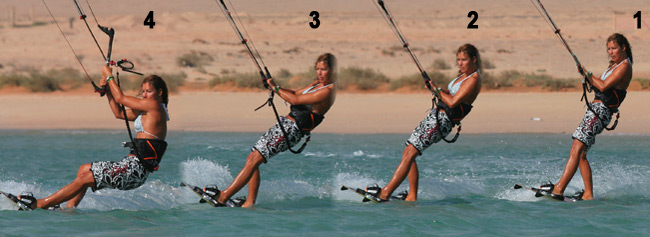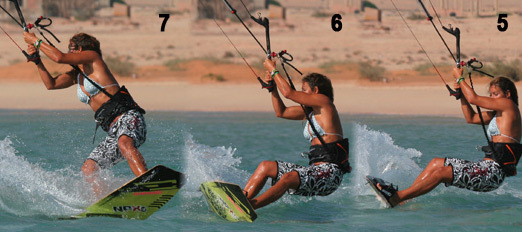Unhooked Downloop
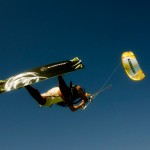
The unhooked downloop is a satisfying piece that unluckily does not get enough airtime these days. When it is at home this move is performed with a pop at the same time the kite loops in a forward direction, which unavoidably will pull you forward into a raley position. As the pull from the kite comes from your front, it is not that too aggressive, and it is another unhooked move that can be easily performed when you surf at an agitated water. Finally, this trick is the originator for a downloop S-Bend.
ALL IN THE TIMING
In pure timing terms you need to be popping early. You should be able to pop from the speed that you take into the move. This way you do not need to let the kite loop move to give power to perform the pop. The result of this is that you will be going up as the kite starts to go around, simply meant that you will get more land and height as the kite finishes its loop move. The longer you wait the lower the kite you’ll fly. This will also end up with the kite starting another rotation before you land.
UNHOOKING A HIGH KITE
Your first concern is the position of your kite. Ideally you will have your kite pretty much at 12 o’clock to start this move. It is good, but you need to unhook too. This means that your approach needs to work for you. With your kite high, the problems of slowing down and not being able to unhook are lurking in the wings. On your approach you will need to drift the kite up at the same time edging hard and then at the last minute bear away loads to slacken the lines off and then go to unhook. Your body position here for unhooking is crucial, so make sure that you push your hips up and shoulders back, otherwise the chicken loop will not slip out easily.
REDIRECTION
Next you need to get your hands sorted. You need to release your back hand and reach forward to grab the bar just underneath your front hand in a fish pole grip during the redirection phase. There is no relevance to whether you are right or left handed. The important thing only is that your front hand steadily stays up against the center line and the released back hand grabs in close to it as possible. If you have just lathered up with some factor 50, this could prove a tad tricky. The slick movement to one side of the bar will get the kite turning sharpish into a downloop.
THE POP
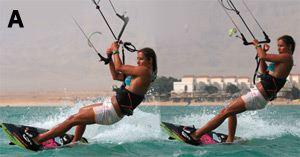 You should be well aware by now of the need for a decent edge to pop-off. If you enter with the correct body position, it will be easy enough to get onto your edge quickly. Your shoulders should be in a back position and your hips forward. Even more importantly is that you need to extend your front leg, so your hips are over your back foot and aim upwind while your hips and shoulders twist. This will allow you to drop your bum low to the water and get into a solid craving position in a quick time. Notice how the surfer has already started to drop into carving after the back hand is released. By doing this, the surfer will have a perfect phase to pop off from the edge before the kite gets too far into its downloop. The surfer will explode up off his back leg by suddenly straightening it, kicking it down onto the heel of his back foot to pop perfectly.
You should be well aware by now of the need for a decent edge to pop-off. If you enter with the correct body position, it will be easy enough to get onto your edge quickly. Your shoulders should be in a back position and your hips forward. Even more importantly is that you need to extend your front leg, so your hips are over your back foot and aim upwind while your hips and shoulders twist. This will allow you to drop your bum low to the water and get into a solid craving position in a quick time. Notice how the surfer has already started to drop into carving after the back hand is released. By doing this, the surfer will have a perfect phase to pop off from the edge before the kite gets too far into its downloop. The surfer will explode up off his back leg by suddenly straightening it, kicking it down onto the heel of his back foot to pop perfectly.
ENTERTAINING AIR
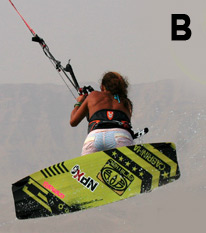 Once you pop up into the air your objective is to follow the pull of the kite. By doing this you will keep your balance and will give you an enough inclination for the landing. The simplest way to go with the kite’s pulling force is to watch it. You can see that the surfer is being pulled through the air by his downlooping kite. Head is in line with the bar, which is pointing at the kite. In a powered downloop, your feet might flick up slightly behind you. As long as you look at the kite, it will not twist you. Also by looking up at the kite, the surfer’s head is lifted. This will make it easier for his feet and board to drop underneath. If you feel the need to take off a hand off for balance, then it must be your back hand.
Once you pop up into the air your objective is to follow the pull of the kite. By doing this you will keep your balance and will give you an enough inclination for the landing. The simplest way to go with the kite’s pulling force is to watch it. You can see that the surfer is being pulled through the air by his downlooping kite. Head is in line with the bar, which is pointing at the kite. In a powered downloop, your feet might flick up slightly behind you. As long as you look at the kite, it will not twist you. Also by looking up at the kite, the surfer’s head is lifted. This will make it easier for his feet and board to drop underneath. If you feel the need to take off a hand off for balance, then it must be your back hand.
TOUCH DOWN
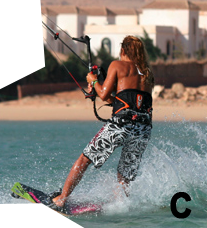 As we mentioned keeping your head up, allow your body to fall into a normal vertical position. If you can keep your arms, or front arm bent, the pull will bring your leading hip forward and set you up for a pleasant downwind landing. The surfer is upright over his board. This gives him the option of going either way depending on where the kite is going.
As we mentioned keeping your head up, allow your body to fall into a normal vertical position. If you can keep your arms, or front arm bent, the pull will bring your leading hip forward and set you up for a pleasant downwind landing. The surfer is upright over his board. This gives him the option of going either way depending on where the kite is going.
When you first land a downloop, follow the kite downwind and watch it loop again. As you see it turn through the center of its rotation and is starting to come up, grab the back of the bar with the hand you swapped over. If you do not get the right timing, just grab the chicken loop and let go of the bar. At least the kite will flutter up and you can sort yourself out.
SEQUENCE FOR THE POP PREPARATION
Pic 1 – The surfer approaches with the kite around 11 o’clock and starts to drift the kite up with a sudden pull-away to allow the body to be pulled up over the board, flattening it and pushing the front foot towards the kite and leaning with the back foot with weight over.
Pic 2 – The surfer forces his hips forward and up at the same time pulling down with both hands.
Pic 3 – As the surfer pushes the bar away and the chicken loop out, the surfer starts to drop his bum and shoulders away from the kite and looks where to go and not at the kite.
Pic 4 – The surfer swaps hands and starts to get back on the edge by driving his feet away.
Pic 5 & 6 – The surfer twists his hips and shoulders to face more upwind, forcing the board to carve hard onto its edge. The kite is starting to steer down and will pull soon
Pic 7 – The surfer pops up hard off his edge extending his back leg.
SEQUENCE AFTER THE POP
Pic 1 – As the surfer pops up the kite, pulling forward is the main goal with offering no resistance at all.
Pic 2 & 3 – The surfer looks towards the kite to keep the balance all the way.
Pic 4 – As the kite starts to rise again, it stops pulling and the surfer starts to drop down. Keeping the bar pulled in with bent elbows, this turns the surfer naturally to follow the kite.
Pic 5 – With the head of the surfer up, the feet and the board drops under and releases the back hand for some added balance.
Pic 6 – The surfer lands over the board, waits for the kite to rise, and then gets the other hand back on the bar.
KEY MARKS
- Kite at 12 o’clock
- Unhook with shoulders back and hips forward
- Change hands
- Carve and pop early
- Follow kite once in air
The video of this trick:
